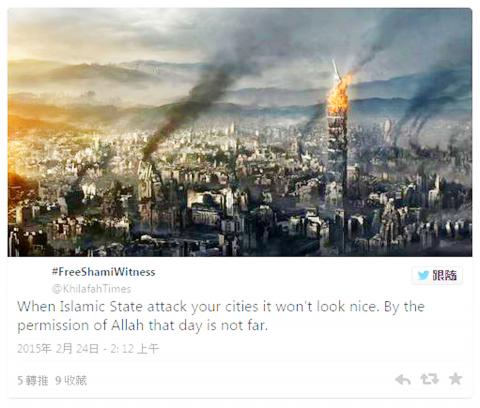Taiwan’s exclusion from international security groups has created “blind spots” for terrorists and criminals to exploit, a report from the Washington-based Center for Strategic and International Studies (CSIS) says.
The report blames China for preventing Taiwan from joining or even participating in organizations that might increase the nation’s “international space.”
The report, Taiwan’s Marginalized Role in International Security, is by CSIS senior adviser for Asia Bonnie Glaser and research associate Jacqueline Vitello.

Screengrab from Twitter
It recommends that Taiwan be granted access to resources including Interpol’s criminal list, the International Atomic Energy Agency’s Incident and Trafficking Database and the International Civil Aviation Organization’s (ICAO) secure database, adding that the nation should be allowed to enter the Financial Action Task Force and to join disaster relief organizations.
“To ensure that Taiwan remains up to date on international safety standards, procedures, and best practices, the island should be allowed enhanced participation in organizations such as the International Maritime Organization, ICAO and the International Physical Protection Advisory Service,” it says.
In addition, it says Taiwan should be able to participate in international military exercises led by the US, including the Rim of the Pacific and Cyber Storm.
The US could appeal to other nations to back Taiwan’s membership in international organizations where possible and its enhanced participation in other cases, the report says, adding that Washington could raise the security risks of marginalizing Taiwan from international security collaboration with senior Chinese officials.
“Despite possessing both the means and the desire to serve as a responsible stakeholder, Taiwan can neither benefit from most international security bodies nor share its considerable reservoir of knowledge and expertise for the common good,” the report says.
The document examines eight areas that it says would benefit from Taiwan’s inclusion, including counterterrorism, law enforcement, human security and cybersecurity.
“Beijing views Taiwan as part of its sovereign territory and thus seeks to prevent Taiwan from joining or even participating in organizations that require statehood — and many that do not,” the report says.
It says that China fears that Taiwan could leverage its presence in international organizations to achieve independence.
However, marginalizing Taiwan from the international community comes at a cost for the rest of the world, the report says.
“By not including Taiwan in the international regimes and organizations that seek to deter and combat global threats such as terrorism and the spread of nuclear weapons, the world is left with gaps in the comprehensive fight for enhanced security,” it says.
“Ways must be found for the people of Taiwan to be better protected and to contribute their well-developed knowledge, skills and resources to international security endeavors,” the report says.
It concludes that Beijing’s obstruction of Taiwan’s participation harms Chinese interests.
“China faces growing threats to its security — threats that require more effective global cooperation,” it says. “Terrorism is an inherently international threat, and the exclusion of competent and willing parties like Taiwan creates dangerous gaps in the fight against it.”

INVESTIGATION: The case is the latest instance of a DPP figure being implicated in an espionage network accused of allegedly leaking information to Chinese intelligence Democratic Progressive Party (DPP) member Ho Jen-chieh (何仁傑) was detained and held incommunicado yesterday on suspicion of spying for China during his tenure as assistant to then-minister of foreign affairs Joseph Wu (吳釗燮). The Taipei District Prosecutors’ Office said Ho was implicated during its investigation into alleged spying activities by former Presidential Office consultant Wu Shang-yu (吳尚雨). Prosecutors said there is reason to believe Ho breached the National Security Act (國家安全法) by leaking classified Ministry of Foreign Affairs information to Chinese intelligence. Following interrogation, prosecutors petitioned the Taipei District Court to detain Ho, citing concerns over potential collusion or tampering of evidence. The

TRADE: The premier pledged safeguards on ‘Made in Taiwan’ labeling, anti-dumping measures and stricter export controls to strengthen its position in trade talks Products labeled “made in Taiwan” must be genuinely made in Taiwan, Premier Cho Jung-tai (卓榮泰) said yesterday, vowing to enforce strict safeguards against “origin laundering” and initiate anti-dumping investigations to prevent China dumping its products in Taiwan. Cho made the remarks in a discussion session with representatives from industries in Kaohsiung. In response to the US government’s recent announcement of “reciprocal” tariffs on its trading partners, President William Lai (賴清德) and Cho last week began a series of consultations with industry leaders nationwide to gather feedback and address concerns. Taiwanese and US officials held a videoconference on Friday evening to discuss the

NEGOTIATIONS: The US response to the countermeasures and plans Taiwan presented has been positive, including boosting procurement and investment, the president said Taiwan is included in the first group for trade negotiations with the US, President William Lai (賴清德) said yesterday, as he seeks to shield Taiwanese exporters from a 32 percent tariff. In Washington, US Trade Representative Jamieson Greer said in an interview on Fox News on Thursday that he would speak to his Taiwanese and Israeli counterparts yesterday about tariffs after holding a long discussion with the Vietnamese earlier. US President Donald Trump on Wednesday postponed punishing levies on multiple trade partners, including Taiwan, for three months after trillions of US dollars were wiped off global markets. He has maintained a 10 percent

PERSONAL DATA: The implicated KMT members allegedly compiled their petitions by copying names from party lists without the consent of the people concerned Judicial authorities searched six locations yesterday and questioned six people, including one elderly Chinese Nationalist Party (KMT) member and five KMT Youth League associates, about alleged signature forgery and fraud relating to their recall efforts against two Democratic Progressive Party (DPP) legislators. After launching a probe into alleged signature forgery and related fraud in the KMT’s recall effort, prosecutors received a number of complaints, including about one petition that had 1,748 signatures of voters whose family members said they had already passed away, and also voters who said they did not approve the use of their name, Taipei Deputy Chief Prosecutor